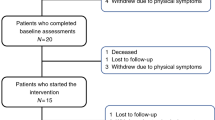Abstract
Quality of life (QOL) is increasingly recognized as an important clinical outcome of hematopoietic cell transplantation (HCT), but patient education is often overlooked. The aim of the current qualitative study was to examine education regarding post-HCT QOL from the patient’s perspective. Allogeneic HCT recipients participated in one of four focus groups. Participants were asked to recall what they had been told about post-HCT QOL as they were preparing for transplant, how their QOL differed from what they expected and how to educate future patients about post-HCT QOL. Verbatim transcripts were coded for both a priori and emergent themes using content analysis. A total of 24 patients participated (54% female, mean age 51, range 23–73 years). Participants frequently expressed the desire for additional education regarding post-HCT QOL, particularly late complications. They noted that late complications were often unexpected, had a profound impact on their QOL and threatened their ongoing sense of recovery. They emphasized that the timing, content and format of education regarding QOL should be flexible to meet their diverse needs. Findings from the current study draw attention to the importance of patient education regarding post-HCT QOL as well as additional QOL research designed with patient education in mind.
This is a preview of subscription content, access via your institution
Access options
Subscribe to this journal
Receive 12 print issues and online access
$259.00 per year
only $21.58 per issue
Buy this article
- Purchase on Springer Link
- Instant access to full article PDF
Prices may be subject to local taxes which are calculated during checkout
Similar content being viewed by others
References
Baker F, Denniston M, Smith T, West MM . Adult cancer survivors: how are they faring? Cancer 2005; 104 (Suppl): 2565–2576.
Heinonen H, Volin L, Zevon MA, Uutela A, Barrick C, Ruutu T . Stress among allogeneic bone marrow transplantation patients. Patient Educ Counsel 2005; 56: 62–71.
Pidala J, Anasetti C, Jim H . Health-related quality of life following haematopoietic cell transplantation: patient education, evaluation and intervention. Br J Haematol 2010; 148: 373–385.
Pidala J, Anasetti C, Jim H . Quality of life after allogeneic hematopoietic cell transplantation. Blood 2009; 114: 7–19.
Braamse AM, Gerrits MM, van Meijel B, Visser O, van Oppen P, Boenink AD et al. Predictors of health-related quality of life in patients treated with auto- and allo-SCT for hematological malignancies. Bone Marrow Transplant 2012; 47: 757–769.
Garcia CM, Mumby PB, Thilges S, Stiff PJ . Comparison of early quality of life outcomes in autologous and allogeneic transplant patients. Bone Marrow Transplant 2012; 47: 1577–1582.
Grulke N, Albani C, Bailer H . Quality of life in patients before and after haematopoietic stem cell transplantation measured with the European Organization for Research and Treatment of Cancer (EORTC) Quality of Life Core Questionnaire QLQ-C30. Bone Marrow Transplant 2012; 47: 473–482.
Frodin U, Borjeson S, Lyth J, Lotfi K . A prospective evaluation of patients’ health-related quality of life during auto-SCT: a 3-year follow-up. Bone Marrow Transplant 2011; 46: 1345–1352.
Bush NE, Donaldson GW, Haberman MH, Dacanay R, Sullivan KM . Conditional and unconditional estimation of multidimensional quality of life after hematopoietic stem cell transplantation: a longitudinal follow-up of 415 patients. Biol Blood Marrow Transplant 2000; 6: 576–591.
Lee SJ, Fairclough D, Parsons SK, Soiffer RJ, Fisher DC, Schlossman RL et al. Recovery after stem-cell transplantation for hematologic diseases. J Clin Oncol 2001; 19: 242–252.
Syrjala KL, Langer SL, Abrams JR, Storer B, Sanders JE, Flowers ME et al. Recovery and long-term function after hematopoietic cell transplantation for leukemia or lymphoma. JAMA 2004; 291: 2335–2343.
Syrjala KL, Langer SL, Abrams JR, Storer BE, Martin PJ . Late effects of hematopoietic cell transplantation among 10-year adult survivors compared with case-matched controls. J Clin Oncol 2005; 23: 6596–6606.
Borkan J . Immersion/crystallization. In: Crabtree BF, Miller WL (eds). Doing Qualitative Research. Sage Publications: Thousand Oaks, CA, USA, pp 179–194 1999.
Atlas.ti Scientific Software Development. ATLAS.ti, Berlin 2008.
Miller SM . Monitoring versus blunting styles of coping with cancer influence the information patients want and need about their disease. Implications for cancer screening and management. Cancer 1995; 76: 167–177.
Ong LM, Visser MR, van Zuuren FJ, Rietbroek RC, Lammes FB, de Haes JC . Cancer patients’ coping styles and doctor-patient communication. Psycho-Oncology 1999; 8: 155–166.
Gruman J, Rovner MH, French ME, Jeffress D, Sofaer S, Shaller D et al. From patient education to patient engagement: implications for the field of patient education. Patient Educ Counsel 2010; 78: 350–356.
Kreuter MW, Wray RJ . Tailored and targeted health communication: strategies for enhancing information relevance. Am J Health Behav 2003; 27 (Suppl 3): S227–S232.
Rimer BK, Kreuter MW . Advancing tailored health communication: a persuasion and message effects perspective. J Commun 2006; 56: S184–S201.
Sun CL, Francisco L, Baker KS, Weisdorf DJ, Forman SJ, Bhatia S . Adverse psychological outcomes in long-term survivors of hematopoietic cell transplantation: a report from the Bone Marrow Transplant Survivor Study (BMTSS). Blood 2011; 118: 4723–4731.
Majhail NS, Douglas Rizzo J . Surviving the cure: long term followup of hematopoietic cell transplant recipients. Bone Marrow Transplant 2013; 48: 1145–1151.
Majhail NS, Rizzo JD, Lee SJ, Aljurf M, Atsuta Y, Bonfim C et al. Recommended screening and preventive practices for long-term survivors after hematopoietic cell transplantation. Bone Marrow Transplant 2012; 47: 337–341.
Acknowledgements
This work was supported in part by NIH K07-CA138499 (PI: Jim), the Miles for Moffitt Milestone Award (PI: Jim) and American Cancer Society MRSG-11-149-01-LIB (PI: Pidala). We acknowledge the Moffitt Survey Methods Core for their assistance with data management.
Author information
Authors and Affiliations
Corresponding author
Ethics declarations
Competing interests
The authors declare no conflict of interest.
Rights and permissions
About this article
Cite this article
Jim, H., Quinn, G., Gwede, C. et al. Patient education in allogeneic hematopoietic cell transplant: what patients wish they had known about quality of life. Bone Marrow Transplant 49, 299–303 (2014). https://doi.org/10.1038/bmt.2013.158
Received:
Revised:
Accepted:
Published:
Issue Date:
DOI: https://doi.org/10.1038/bmt.2013.158
Keywords
This article is cited by
-
Readability of Online Patient Education Materials for Graft-Versus-Host Disease
Journal of Cancer Education (2023)
-
Protocol for a feasibility trial (EXPRESS-C-GVHD) for an expressive helping intervention within a support group for cutaneous graft-versus-host-disease
Archives of Dermatological Research (2023)
-
“Is this the GVHD?” A qualitative exploration of quality of life issues in individuals with graft-versus-host disease following allogeneic stem cell transplant and their experiences of a specialist multidisciplinary bone marrow transplant service
Health and Quality of Life Outcomes (2021)
-
Health-Related and Economic Burden Among Family Caregivers of Patients with Acute Myeloid Leukemia or Hematological Malignancies
Advances in Therapy (2021)
-
Information Needs for Treatment Decision-making of Hematopoietic Cell Transplant Patients 65 Years or Older and Caregivers
Journal of Cancer Education (2020)



